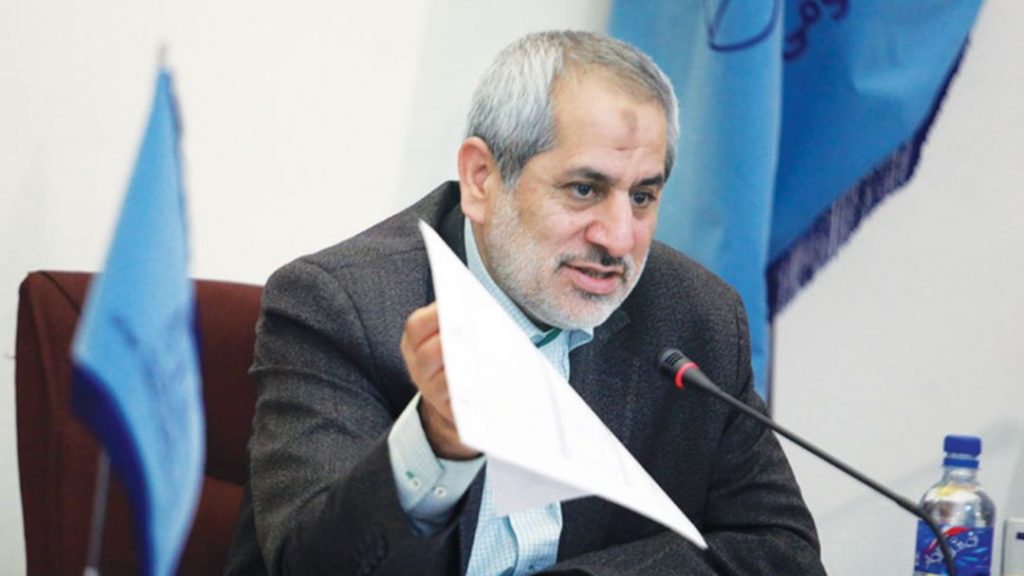CHRI – A lawsuit has been filed in an Iranian court against the CEO of the Telegram messaging app, Pavel Durov, accusing the app of servicing terrorists and spreading immorality, Tehran Prosecutor Abbas Jafari Dowlatabadi announced on September 26, 2017.
 “This network, which operates under Western laws, cannot stop us from investigating this suit,” said Dowlatabadi, according to the judiciary’s official news agency, Mizan.
“This network, which operates under Western laws, cannot stop us from investigating this suit,” said Dowlatabadi, according to the judiciary’s official news agency, Mizan.
“According to the suit, the Telegram network provides services to terrorist groups such as Daesh [ISIS] as well as other criminal organizations and promotes and facilitates child pornography, human trafficking and drug use,” added Dowlatabadi.
The Tehran prosecutor said the case was being investigated by the international division of his office, but did not reveal who or what organization filed the suit.
Reacting to the news, Durov said on Twitter on September 26, “I am surprised to hear that. We are actively blocking terrorist and pornographic content in Iran. I think the real reasons are different.”
“Just checked with our team of moderators: they are blocking over >1,000 channels/bots/chats with porn/terrorist content in Iran every day,” he tweeted.
The internet and social media apps are heavily restricted and censored in Iran, with hardliners in the government viewing any form of internet freedom as a threat to the Islamic Republic.
The suit follows years of efforts by conservative Iranian officials aimed at blocking nationwide access to Telegram, which has frustrated attempts by state agencies to censor and control content on the network.
The app, which Telegram claims is used by more than 40 million people in Iran, offers a private messaging service and private and public “channels” that operate similar to Facebook pages.
On August 7, 2017, the country’s Supreme Cyberspace Council (SCC) ruled that all foreign social media networks must store domestic traffic data inside Iran, a move intended to pressure companies that wish to maintain a presence in Iran to aid state surveillance efforts or face being blocked.
According to Article 2 of the SCC’s ruling, foreign messaging networks must store their Iranian data inside Iran and have a representative based inside the country in order to operate there.
“The operational conditions of the messaging services will be prepared and compiled under Telecommunications Ministry guidelines by a working group comprised of representatives from the ministries of telecommunications, culture and Islamic guidance, and intelligence, as well as the president’s office, the prosecutor general’s office, the Islamic Propagation Organization, the cyber police force, and the Islamic Revolution’s Guard Corps,” said the SCC ruling.
On July 26, 2017, Deputy Prosecutor General Abdolsamad Khorramabadi threatened to take then Telecommunications Minister Mahmoud Vaezi to court for his alleged refusal to block “about 8,000” channels on Telegram.
The minister was appointed in 2013 by President Hassan Rouhani, who—mostly blocked from appearing in conservative-dominated state media—has relied heavily on Telegram to reach the electorate during his presidential campaigns.
“For reasons known to the telecommunications minister, we have so far been lenient in our response to the ministry’s failure in carrying out judicial orders,” said Khorramabadi.
“From now on, if the minister does not carry out the orders, we will definitely file criminal charges against him after receiving permission from the prosecutor general and senior judicial officials,” he added.
“He thinks everything should be blocked,” said Vaezi about Khorramabadi in a meeting with a group of conservative members of Iran’s Parliament on July 15, 2017. “But based on what Iran and the world has learned from experience, we believe that shutting down more sites will reduce opportunities and push people to use filter breakers.”
Vaezi, who was appointed as Rouhani’s chief of staff in 2017, was reacting to claims by the deputy prosecutor general that the Telecommunications Ministry’s attempts to gain Telegram’s cooperation in blocking “criminal content” had resulted in “almost nothing.”
Khorramabadi added: “Just as we did not allow Turkcell to operate phone lines in Iran, I believe foreign social media networks should not be allowed to host information exchanged between the people of our country.”
“Internet communication is much more sensitive and important that phone communication,” he said.
In May 2014, a judge in Fars Province summoned American Facebook founder Mark Zuckerberg to appear in an Iranian court as part of a case against social media networks brought by unidentified citizens allegedly complaining of breaches of privacy.
Facebook is banned in Iran and there is no extradition treaty between Iran and the United States. No ruling was ever made or announced in the case.
 Shabtabnews In this dark night, I have lost my way – Arise from a corner, oh you the star of guidance.
Shabtabnews In this dark night, I have lost my way – Arise from a corner, oh you the star of guidance.


